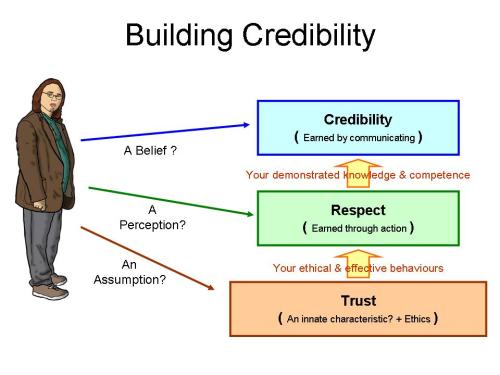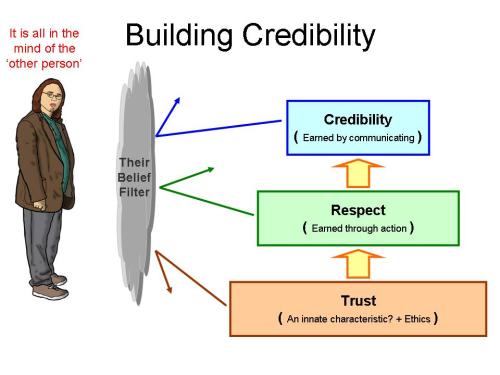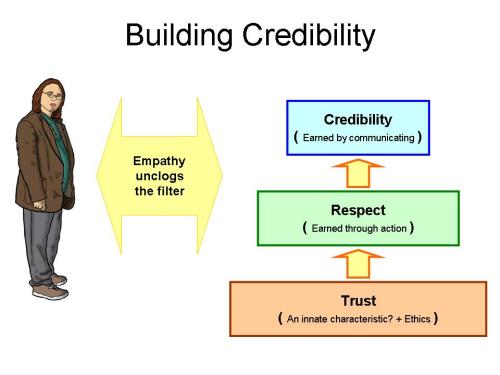There are all kinds of skills, qualities, and talents you need to be a successful project manager, but credibility is the single most important quality every project manager must possess. You certainly need to be able to see the big picture, be a leader, motivator, inspector and persuader; but, all of these qualities mean nothing unless you are seen to be credible.
Credibility is a combination of being seen to be trustworthy, convincing, and reliable. It is built in the minds of other people who are ‘watching you’ or need to rely on you, particularly your team members, managers and other key stakeholders. People judge for themselves whether to take you at your word or not.
The Building Blocks of Credibility:
The key building blocks are set out below:

Trust is the foundation – when someone trusts you, you can build respect through ethical and effective behaviour. Trust is simply the assumption that you will behave properly and do what you say you will do; most pet owners trust their pets to behave! You earn respect by demonstrating ethical and effective behaviours. But respect is not enough – you can respect gallant losers and enemies.
The step from respect to credibility requires demonstrated competence, underpinned by knowledge (for more on competence see WP1056 Competency). When someone believes you are credible, that will listen to your advice and act upon your suggestions.
However, the beliefs perceptions and assumptions have to be real in the mind of the ‘other person’!
If your operating framework is not aligned with the other person’s belief framework you cannot be credible to them – it’s all in the mind of the other person.
You may be the greatest IT project manager in the world, but if the way you dress and the jargon you speak does not fit with a particular senior executive’s beliefs about how competent mangers dress and speak, you will not be credible to that executive.
The way to break through the ‘belief barrier’ is to build empathy.
Empathy is the capacity to recognise the emotions that are being experienced by another – the ability to ‘stand in their shoes’. Within business this is more generally characterised by a combination of beliefs and desires, and grasping these beliefs and desires is essential to being able to develop empathy.
The ability to imagine oneself as another person is a sophisticated imaginative process. An empathic interaction, however, involves you communicating an accurate recognition of the significance of another person’s ongoing intentional actions, associated emotional states, and personal characteristics in a manner that the other person can appreciate. It’s not the message itself that matters so much as the way it is communicated.
Put all of this together and you can build you credibility one stakeholder at a time.
Maintaining Credibility:
There are a number of things you can do as a project manager to maintain your hard earned credibility, including:
- Do What You Say You Are Going to Do – Following through is easier said than done, and requires thoughtfulness to back up your words with actions…all the time. Your team is always watching how you behave. If you say you’re coming in early the next morning to knock out a tough part of the project plan, then make sure you show up early. Credibility starts with following through on your smallest commitments and migrates all the way up to your major promises. If you are not quite sure you can follow through; then don’t commit to it just yet. There’s nothing wrong with keeping your mouth shut and doing a bit more research before committing, and then following through on your promise.
- Don’t Talk Too Much – The more incessantly you talk, the less credibility you will have. Certainly, project managers need to talk, usually a lot. The key is to find the optimal point at which you become and stay credible by moderating how much you say and what you talk about. You can always add a bit more ‘talk’ if needed, it is impossible to unspeak something that is already said.
- Listen to Your Own Conversation – A very helpful practice is to listen to your own conversation and reflect on your dialogue with project team members. They’ll remember everything you say, so should you!
Some Simple Ways to Destroy Your Credibility
It takes years to build up a storehouse of credibility, and it is a great asset to have. Then, if and when you do make an honest mistake, that storehouse of credibility will bring you through the storm. However, there are certain things that will destroy your credibility within a matter of moments:
- By Accident – Certain things are out of your. You must rely on others to do what they say they are going to do. You can follow up, cajole, and persuade as much as possible, but ultimately it is the responsibility of the resource to get the job done. Your superiors will understand for a little while if you are unable to deliver on a project because of other people’s shortcomings. However, these little accidents will ultimately undermine your credibility if they continue to occur.
- By Covering Up – You will destroy your credibility if you deliberately conceal information, it is a breach of trust – the foundation of credibility.
- By Being Manipulative – Another way to instantly lose credibility is to be manipulative. One technique of manipulation is convincing someone else that it’s in their best interest they get something done, when the reality is it’s in your best interest. Once the deception is uncovered your credibility is gone.
Conclusion
Build a solid base of credibility and your project management career will flourish. Trust is the foundation (for more on trust see: WP 10030 The Value of Trust). From this base your actions and competency build credibility. It’s hard earned, invaluable for influencing managers and ‘advising upwards’ effectively to help your managers help you, and it is easily destroyed!



Nice article starting a new project, in a new company and new sector, it like starting all over again.
Communicating, skills, qualities, and talents are playing an important role in the project manager career.
Pingback: PMIAUS13 | Stakeholder Management's Blog
Pingback: PMIAUS13 | Mosaicproject's Blog
Pingback: What is your personal brand? | Mosaicproject's Blog